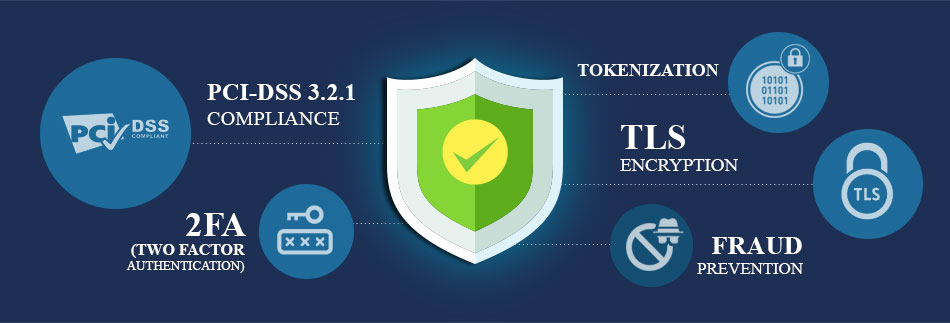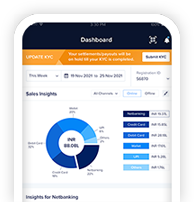How We Secure Your Online Payments at CCAvenue
With the growing number of e-commerce users and online transactions in India, it is highly imperative to implement necessary security protocols for e-commerce websites, in order to avoid fraudulent circumstances. As a leading technology company that offers complete online payment solutions, we understand the gravity of online payment security. At CCAvenue, we go all-out to provide the maximum level of security and ensure that every transaction that is done via our payment gateway is a secure one. We safeguard the interest of both the online businesses who use our services, as well as their consumers who transact online.
Let us walk through the various security protocols and practices followed at CCAvenue to ensure secure payments when transacting online:
-
PCI-DSS 3.2.1 Compliance
The PCI Security Standards Council is a global organization that maintains and promotes compliance rules for managing cardholder data for all e-commerce websites and online payment systems. The Payment Card Industry Data Security Standards (PCI-DSS) is a set of policies that regulate handling of sensitive cardholder information. E-commerce businesses or online payment entities can become PCI-DSS compliant if they maintain a secure payment processing network, ensure all card data is encrypted during transmission, restrict access to confidential information (both electronically and physically) and keep their infrastructure secure at all times. PCI-Compliant entities such as CCAvenue stay well-informed of new PCI-DSS mandates. They always strive to keep their software and spyware updated as well as run system and software checks often to protect the system against known software vulnerabilities.
-
TLS Encryption
TLS (Transport Layer Security) is a widely adopted security protocol designed to facilitate privacy and data security for web communications. Web browsers and other applications use TLS to encrypt sensitive information transmitted over the Internet instead of the now defunct SSL (Secure Sockets Layer) standard. To establish the reliability of TLS, security certificates are issued by Certificate Authorities (CAs) for different websites. The TLS Certificate informs users that the data transmitted between the web server and their browser is safe. Being a leading Indian payment processor, CCAvenue has adopted TLS 1.2, the latest version of TLS (Transport Layer Security) protocol for processing e-transactions. In the absence of TLS Encryption, all data sent over the web will be unencrypted and visible to whoever has the means and intention of intercepting it. A simple method of verifying if the e-commerce websites you visit are SSL/TLS certified is to check for the 'https://' or 'https://' protocol in the web URL. The additional 's' indicates a secure e-payment system. Alternatively, you can look out for the padlock icon at the beginning of the URL. Modern web browsers have started marking HTTP sites as insecure on their own as they strive to make the Web secure by default.
-
Tokenization
Tokenization is a process of replacing the 16-digit card number with a unique, randomly generated digital identifier known as a 'token'. This ensures safety of the card-holders' confidential information while allowing the payment gateways to securely access this information and initiate a secure payment. Even if a website suffers a breach and the stored tokens are hacked, it is almost impossible to penetrate this encryption and reverse-engineer the actual card number from the token. It is immensely difficult to access the logic used for tokenization and hence this reduces security breaches. Hence Tokenization strengthens data protection for e-commerce websites and minimizes online security breaches as it eliminates the need for storing credit card data.
-
Two-Factor Authentication
Two-Factor Authentication, commonly known as 2FA, is an additional layer of security process added by e-commerce websites, in which the user provides two different authentication factors to verify themselves when online transactions are processed. 2FA is a customer-facing authentication process, mandated by regulatory bodies like RBI to better protect both the user's credentials and the resources the user can access. The transaction will not be processed further until the user provides data which only they could know, or have at hand such as a security key or a physical token. There are several banks and payment gateways that avail the 2FA for their own payment modes. RBI mandates the use of 2FA for net banking transactions, wherein you would be initially required to provide your user name and password in the first step. The bank will then send you an OTP on your registered mobile number, which you need to provide as a final confirmation to complete the transaction.
-
Fraud Prevention
The four security protocols specified above are mandatory, but most e-commerce websites and payment gateways also have their proprietary fraud and risk prevention systems. These systems have been developed over time using big data analytics and machine learning. CCAvenue too offers a proprietary risk management system that combines best practices, leading technology and human intelligence for efficient risk mitigation. Our risk management solution seeks to minimize potential losses faced by merchant partners on account of chargebacks. This solution also provides an unprecedented level of risk detection and helps assess each transaction against a negative database collected over 17 years. CCAvenue also provides its merchants a range of customizable transaction controls like velocity checks and blacklist controls to set specific criteria to limit their risk exposure.
Velocity Checks: You can define a simple velocity filter for several parameters and all the transactions will be passed through the velocity filter before being processed.
Blacklist Controls: Based on your data of negative transactions you can restrict fraudsters from transacting on your site by blocking their Country, Email ID, Card Number or Geo IP location.
All these 5 protocols are critical for e-commerce businesses as they prevent frauds and minimize risks. Alternatively, you can choose a payment gateway such as CCAvenue that already has stringent security protocols in place.



















 INFIBEAM AVENUES
INFIBEAM AVENUES
